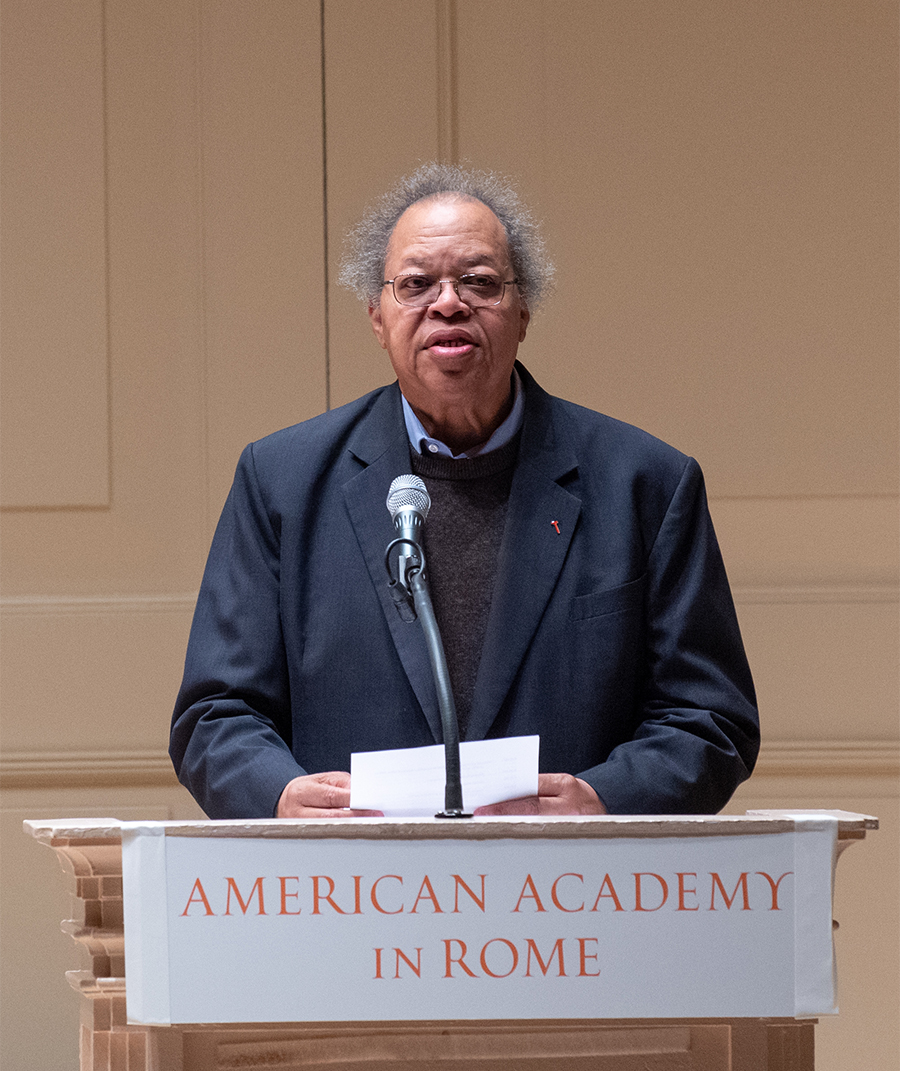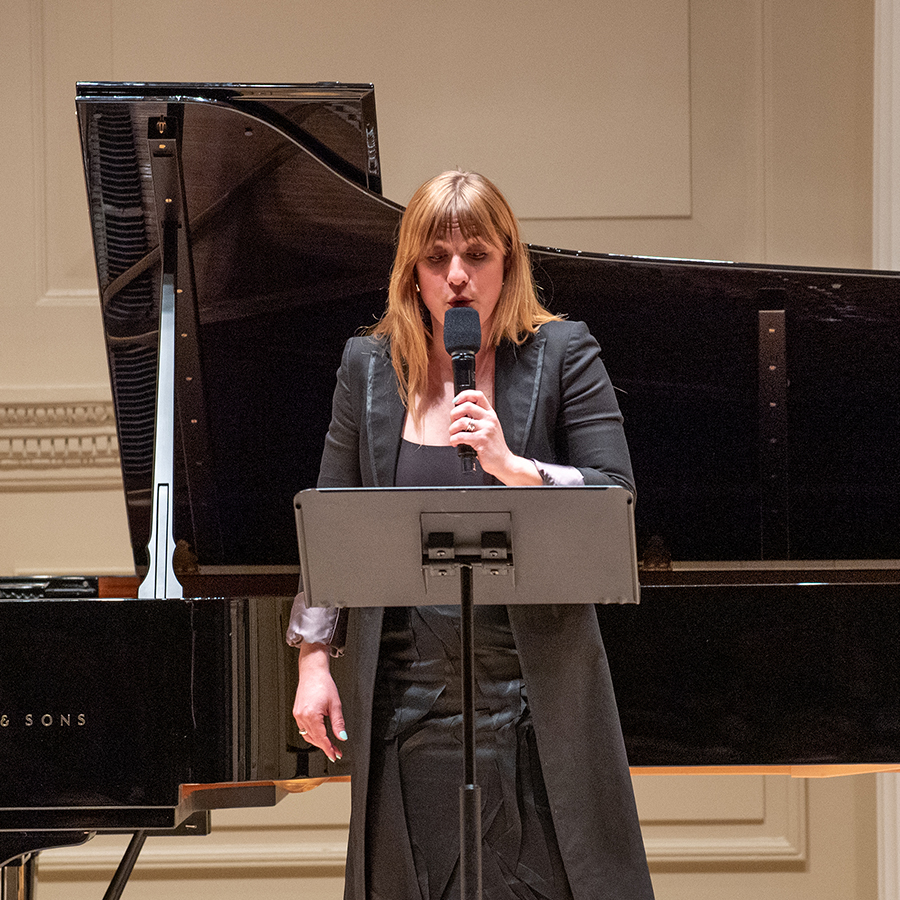Since the first Pulitzer Prize in Music was first awarded in 1943, thirty-four of the seventy-eight prizes have been awarded to Academy Fellows or Residents, a fact that illustrates the outsized impact the American Academy in Rome has on new music in the United States. It was fitting, then, that the Academy’s annual Janet and Arthur Ross Rome Prize Ceremony on April 25 honored the newest prize winners while also paying tribute to decades of music by AAR-affiliated composers, from Roger Sessions (1931 Fellow) and Ulysses Kay (1952 Fellow) to Anthony Cheung (2013 Fellow) and Courtney Bryan (2020 Fellow).
There was another reason for this spotlight on musical composition. The Academy’s Rome Prize Ceremony took place a full century—almost to the day—from a benefit concert for AAR at Carnegie Hall, during which George Gershwin’s Rhapsody in Blue had its debut in that room. Since then, many icons of American music have passed through the Academy, including Samuel Barber (1937 Fellow), Aaron Copland (1951 Resident), and Elliott Carter (1954 Fellow). Slowly, but surely, the Academy became more representative of the US, with female composers and composers of color receiving long-overdue recognition. And the discipline of music composition itself shifted and deepened in exciting new ways, including, for example, experimentation with electronic equipment, instruments, and synthesizers.
The magic ingredient was the composer and musicologist George Lewis (2010 Resident), who served as musical advisor of the concert. He thoughtfully curated a selection of music that showed off the rich diversity—both formally and historically—of Fellows and Residents in musical composition, enlisting the unsurpassed talents of performers from the International Contemporary Ensemble, of which Lewis is artistic director, to realize it.

The accomplished flautist Alice Teyssier kicked off the musical program with Prelude for solo flute by Kay, who was the Academy’s first Black Rome Prize winner in any category. After that, Teyssier (this time as soprano) and Erika Dohi (piano) performed the second movement of On Loving by Sheila Silver (1979 Fellow), the first female Rome Prize Fellow in musical composition, which is set to a sonnet by Edna St. Vincent Millay.
Following this, Cory Smythe performed Sessions’s piano solo From My Diary, which was likely composed during his time at the Academy. Next, Ten Thousand Blooms, the energetic second movement of Shih-Hui Chen (2000 Fellow)’s Fantasia on a Theme of Plum Blossom, stirred the audience with Smythe on piano and Joshua Rubin on clarinet. The music draws inspiration from a melody in Nan-Kuan, a traditional style of southern Chinese/Taiwanese music, that dates to as early as 500 CE.
Bryan’s beautiful quartet In the Heart of God, for flute (Teyssier), clarinet (Rubin), violin (Michelle Ross), and cello (Mariel Roberts), followed; its more traditional style contrasted with the more experimental pieces in the program. Mouthpiece II by Erin Gee (2008 Fellow), performed next by Teyssier, was perhaps the most experimental of all of them: a nonsemantic vocal work in which the singer’s voice took on miraculous new timbres and qualities, more like those of an instrument than a human voice. (“How on earth do you score it?” one audience member wondered.)
David Sanford’s Seventh Avenue Kaddish, a cello piece written by our 2003 Fellow in the aftermath of the September 11 attack (performed by Roberts), provided a haunting counterpoint to the humor and surprise of Gee’s work. Cheung’s Bagatelles, a quintet with piano (Dohi), two violins (Ross and Pala Garcia), viola (Kyle Armbrust), and cello (Roberts), offered a complex and layered series of melodies that, like Rhapsody, seemed influenced by the improvisational style of jazz music. Four of the composers—Chen, Gee, Sanford, and Cheung—were not only in the program but also in the audience and stood to be recognized. It is not every day that you sit in the same audience with the composers whose music you are hearing!
Of course, to complete the evening, the audience was treated to Impressions on Rhapsody in Blue, created for the occasion by Rubin on bass clarinet and Smythe at the piano. With exaggerated glissandos, the familiar melodies of Rhapsody began to slowly take shape, as if through a fog. It was a Rhapsody reimagined for our time.

The idea to expand the annual Rome Prize Ceremony to include a full concert that would mark the 1924 benefit was nearly two years in the making. “I was reading Martin Brody’s wonderful history of music at the American Academy in Rome and noticed that the centennial of the original benefit concert would take place at exactly the time of year we have our Rome Prize ceremony, and it seemed too good of an opportunity to pass by,” said Andrew Mitchell, the Academy’s director of communications.
Instrumental to the evening’s success were the members of the concert’s committee, starting with Brody (2002 Resident), Nico Muhly (2018 Resident), and David Lang, (1991 Fellow, 2017 Resident), who lent their advice on how the evening could best represent the Academy. The committee also generously donated to support music and fellowships at the Academy, allowing last week’s event, like the one a hundred years earlier, to raise funds for the Academy. We were humbled by this generous display of support.
The Rome Prize is among the most sought-after fellowships of its kind. This is especially true of the handful of fellowships in musical composition that AAR awards every year. Last Thursday’s performance only raised expectations that the next century of music at the Academy will be as influential as the first. As Lewis stated in his program notes, “I’d like to suggest this [concert] constitutes a most variegated imagining of what a year in Rome with America’s finest scholars and artists might sound like. I hope you enjoy these fruits of the Academy’s world.”